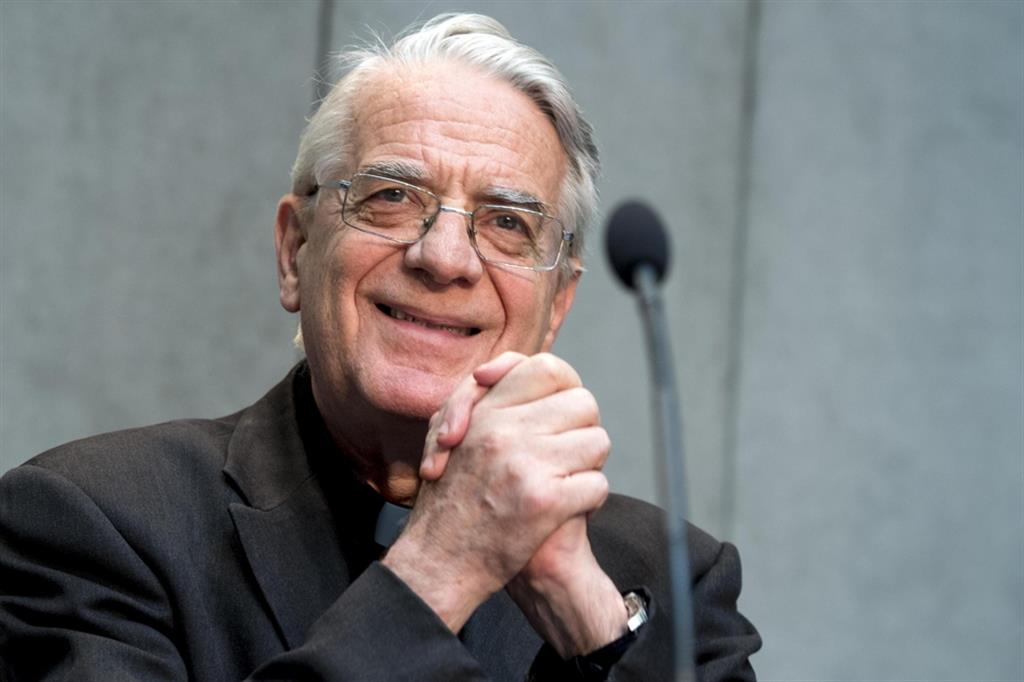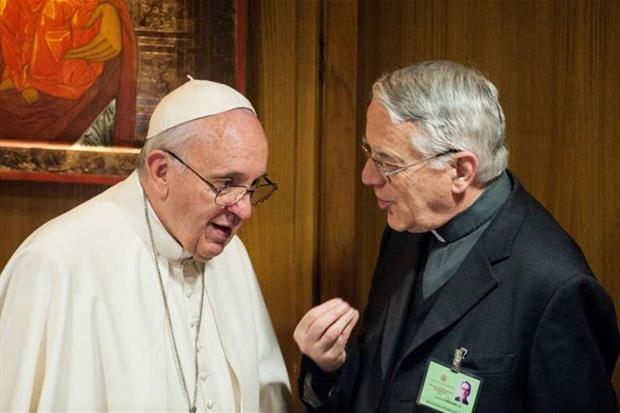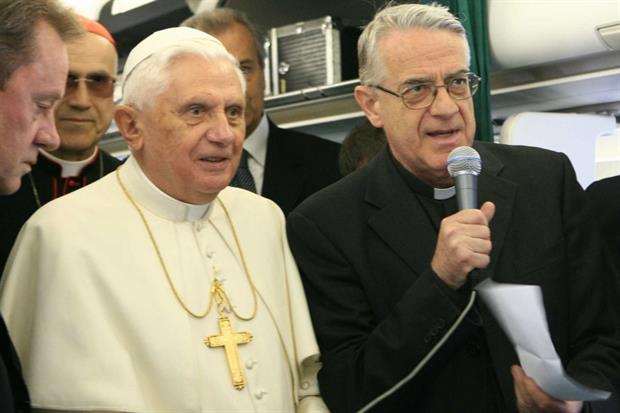
Father Federico Lombardi during a press conference – Ansa
He considers himself and describes himself as a “simple” Jesuit – he who by training is a professional mathematician – “I graduated in this discipline in 1969 at the University of Turin”, who, for a strange design of destiny, spent a lot of money part of his long life as a priest as a “man of Vatican communication” at the service of three Popes: John Paul II, Benedict XVI and Francis.
It is the portrait that stands out most to understand but also to define a complex, affable but in some ways shy figure – perhaps typical of those from Piedmont – like that of Father Federico Lombardi since 2016 writer emeritus de La Civiltà Cattolica and president of the Vatican Foundation Joseph Ratzinger-Benedict XVI.
On August 29, Father Federico will cross the milestone of 80 years of life: having been born, on that day, in Saluzzo, a small and very Savoyard city in the Cuneo area. “Reaching this goal – is the confidence of the religious who welcomes us on a warm and sunny August day at Villa Malta in Rome, home of the prestigious magazine La Civiltà Cattolica – it means above all to take stock of one’s own life, asking oneself what, as an elderly person, with one’s memories but also limits and testimonies one can pass on to the new generations. Who will come after us ».
But for Father Lombardi this anniversary symbolizes something more. “I live my birthday – he continues – as the anticipation of a greater joy: the one I will experience, in a few days, my fiftieth Mass which took place on September 2, 1972. The fact that I was ordained a priest in Germany while I was concluding my studies in theology in Frankfurt was my “baptism of fire” as a priest. One of the most beautiful privileges was to bring the announcement of the faith, in that year so special for me, to the many Italian immigrants in a popular environment ».
Father Federico Lombardi belongs to an important family in Piedmont that has its roots in social Catholicism: his uncles were the Jesuit, a trusted man of Pius XII, famous for his sermons in the 1950s and for this reason called the “microphone of God ”Riccardo and the well-known jurist Gabrio who was, in 1974, among the main souls in the battle of the referendum for the repeal of the law on divorce; his grandmother Emma Vallauri was the founder of the Italian Catholic Action Women’s Union.

Father Lombardi discusses with Pope Francis – Observer / Vatican News
How much did being the grandson of Riccardo Lombardi influence your vocation as a Jesuit?
Having a Jesuit uncle in my family allowed me to understand this Order better because I was already familiar with its style of apostolate. I saw little of my uncle and I remember his proverbial itinerancy for his conferences. But as in the case of Carlo Maria Martini, it was above all the direct contact with the fathers of my school the Sociale di Torino that pushed me to join the Company “
In 1973 he joined the college of writers of “La Civiltà Cattolica” and in 1977 he became deputy director. What memories do you have of those years?
It was a period full of enthusiasm, which lasted about 11 years until 1984, and of renewal in the wake of the conciliar instances thanks to the charismatic guide of Bartolomeo Sorge: a man of great culture and intense spiritual life able to stand hours and hours in front of the to the tabernacle. With him I had the emotion, on June 14, 1975, to hand over the 3,000th issue of the magazine in the hands of Paul VI. I still remember Father Sorge’s emotion in front of Pope Montini. And in a certain sense, on February 24, 2017, when the current editor of the magazine Father Antonio Spadaro gave Pope Francis the 4 thousand issue of our fortnightly, it seemed to me that I was reliving the same trepidation and historical moment experienced in 1975.
In 1984 for six years until 1990 he found himself leading the Italian Jesuits as provincial superior… What did that experience mean?
Those years allowed me to get to know in depth the reality of the Society of Jesus in Italy, made up of about 1,200 religious, spread over 90 houses. Among the most beautiful experiences was the visit to the missions of our fathers in difficult lands such as Madagascar or Brazil. As a provincial I was the one who suggested to Father Sorge, after the experience of La Civiltà Cattolica to go to Palermo to graft a new lymph at the Pedro Arrupe Institute of Political Education. I think it was a winning bet.
In 1990 he truly became a “man of communication of the Holy See”: he was in fact assigned by superiors to Vatican Radio first as program director (1990-2005) then general director (2005-2016) and finally at the head of the Vatican television center, the Ctv (2001-2013). What balance do you feel you have to draw up of that period?
Perhaps it was one of the most fruitful moments of my career at the service of the Apostolic See. What a Jesuit of the Catholic Civilization was “hijacked” to Vatican Radio was nothing new. Before me it had happened to two illustrious confreres such as Giacomo Martegani and Roberto Tucci, who later became a cardinal. The contact with all the staff, often polyglot, the knowledge of the editions in various languages of the radio broadcasts and then being able to participate in the Apostolic Journeys in the middle of the Pontificate of John Paul II remained: I alternated in this role with the my then superior father Pasquale Borgomeo.
A completely different experience was that of the Ctv where he closely followed the end of the pontificate of John Paul II.
For me it was a privilege to be the director of the Vatican Television Center at that historical moment, 2005, because thanks to those exclusive videos we were able to tell the general public about the suffering, agony and death of a holy pope like Karol Wojtyla. It was an almost public exposition of the Holy Father to show the world not only his suffering but his entrusting himself to the Lord.
On 11 July 2006, the appointment as director of the Holy See Press Office arrives. A position he will hold until 2016 with Pope Bergoglio.
Even today I cannot explain why I was chosen above all as I had to take over from a very authoritative figure like Joaquín Navarro-Valls. The director of the Press Office is often imagined as the “spokesperson” of the Pope, but this is not the case. It is not only necessary to present to all the media in the world who the Bishop of Rome is, but often in that role you have to tell other details how, for example, the complex machine of the Roman Curia works … For me that 2006 represented, in truth, almost a new beginning: an apprenticeship to learn how to be a “spokesperson”.
A very special relationship was the one that Benedict XVI lived alongside. Can you tell us why?
In a certain sense, I accompanied him for almost all of his Pontificate from 2006 until his resignation from the Petrine ministry in February 2013. Behind a certain hint of shyness due to the fact of being a man of study, Pope Ratzinger is not only a man affable but who always put me at ease. I would define him as a theologian pope with very clear ideas. His resignation from the Petrine Chair was not an unexpected surprise for me. Already in 2010 in the famous book-interview “Light in the world” with Peter Seewald, Benedict mentioned the hypothesis of renunciation mainly for health reasons and of not being able to carry out his public mission as successor of Peter in the best possible way. After the trip to Lebanon in September 2012, already 85 years old, conducted by him in an excellent way, he had already understood that the forces and energies of the past had failed. What struck everyone was the serenity and detachment of his renunciation.
A Pontiff with whom he used to speak in German or Italian.
Here too a great virtue of Ratzinger has always taken over: humility. In his talks with me he has always preferred to speak in Italian and not in German. On the other hand, he speaks our language with greater familiarity than I have mastered his. Only in particular circumstances when we found ourselves talking with his personal secretary, now archbishop, did Monsignor Georg Gänswein prefer the use of his mother tongue. And at the end of these three-way talks he had the finesse to repeat the same things in Italian. And my reply was amused: “Holy Father, translation is not necessary, I understand his language having studied it for many years …” ».
When did you last meet the Pope Emeritus?
Last May 7 to update him on the news of the Award and of the Foundation dedicated to him. He speaks with a faint voice and in order to express his real thoughts, he is helped in this mediation by his secretary, Archbishop Georg Gänswein. He still retains a formidable clarity of mind. He has a truly remarkable memory and connection skills for his age of himself. All this can be seen from the quality of her questions and his answers. What did this last meeting leave me? The idea of a man who, despite his frailty, transmits serenity, I believe also thanks to an intense life made of prayer. He always takes his leave, giving you a beautiful smile and feels ready for the definitive encounter with the Lord.
In 2013 he found himself the spokesman for Pope Francis, his brother, and the first Jesuit Pontiff. What snapshots do you keep of those three years?
I saw for the first time in 1983 my confrere Jorge Mario Bergoglio on the occasion of the XXIII General Congregation of the Jesuits in Rome in 1983 which led to the election of the superior of the Company Peter Hans Kolvenbach, a man of great ascetic rigor, But it was a formal meeting . True personal knowledge took place with his election to the Throne of Peter in 2013. It was a grace for me to live with him the beginning and therefore perhaps the most programmatic part of his pontificate: accompany him on his first apostolic journeys and above all discover his spontaneity and empathy he has with every person who meets him and approaches him. What I have in common with him is the language of Ignatian spirituality and the knowledge and practice of the Spiritual Exercises. Words such as discernment or his idea of carrying the proclamation of the Gospel in today’s world and in the sign of the times are part of a typical language of us Jesuits. The most beautiful gifts of the three years spent alongside the Pope were those of discovering his freedom in spirit (just think of his spontaneous gestures such as telephone calls) and the breath of freshness that he brought inside and outside the Church.
Father Federico on the threshold of his 80 years how does he spend the rest of his days?
Living as a simple priest and superior of the Jesuit community de La Civiltà Cattolica. If I can, I write some articles, often of ecclesial life, for the magazine. Just as the late and longest-lived editor of the magazine Father GianPaolo Salvini did as long as he could. Now I have managed to caress an ancient dream of mine: I am among the curators of positio for the process of the cause of beatification of a Jesuit very dear to me and a man of dialogue with China: Matteo Ricci (1552-1610) from Macerata. I live my ministry with hope and faith and look without nostalgia at the glorious past of my Order, a bit like Cardinal Martini used to do in the final parable of his existence, but always nourishing trust in the future of the Church. And who will come after me.

Father Lombardi with Benedict XVI – Ansa
80 years and 50 of Mass. Father Federico Lombardi: “My life alongside three Popes”

